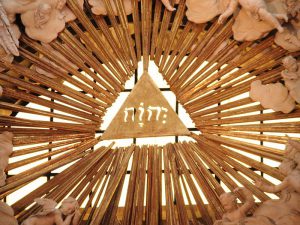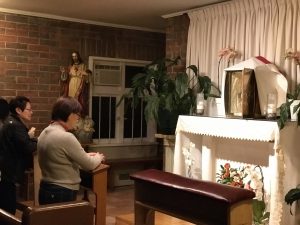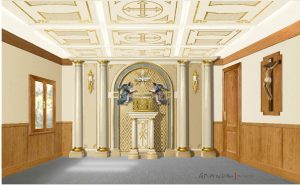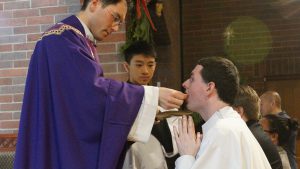In 2010, after being in Rome for nine months, I was sent to Taiwan for the summer. When I compared Taiwan with Rome, you know what I realized? I hated Rome. Don’t get me wrong: I love the people, but Rome is disorganized, cramped, a lot of the people in the city are rude; even Italians call the city dirty! At the airport, there were no lineups; people just run and push towards the customs desk. You’ll go to a store only to find it closed for no reason.
[Listen to Fr. Justin’s homily here.]
Part 1
Part 2
I remember thinking, “What am I doing here?” But I felt at home in Taiwan! People were polite; the country is clean; the streets are perpendicular (not a maze). It might have been hot and humid, and my Mandarin was terrible, but I could live there.
- Taiwan
- Rome
Brothers and sisters, dear guests, some of us have immigrated here and while some of us feel at home, some of us don’t. Some of us feel at home at our current jobs: we know we should be there. Some of us have searched for a church community to which to belong, and when we find it, we know it!
I feel so badly for people who don’t feel at home in life, in their families, schools, jobs, churches, and houses, because we’re designed to be at home. The key sign of not feeling at home is loneliness.
In November, we talked about the three transcendentals of truth, goodness and beauty, qualities common to all things that reflect God! There’s another transcendental, called being, which Fr. Robert Spitzer calls ‘home,’ when we have a “perfect sense of harmony with all that is,” with the whole cosmos (Ten Universal Principles, 137). Now, of course, our true home is heaven, but we shouldn’t feel a sense of alienation now; we should feel at home with God, in the Church, and with the people around us. And when this need is fulfilled, philosophers, theologians, and mystics tell us that we experience six realities: awe, holiness, joy, love, unity, and quiet (Fr. Robert Spitzer, SJ, New Proofs for the Existence of God, 282).
God wants us to be at home with Him! This is what Moses experiences according to the First Reading. “Moses… led his flock beyond the wilderness, and came to Horeb, the mountain of God. There the angel of the Lord appeared to him in a flame of fire out of a bush; Moses looked, and the bush was blazing, yet it was not consumed. Then Moses said, ‘I must turn aside and look at this great sight, and see why the bush is not burned up.’ When the Lord saw that Moses had turned aside to see, God called to him out of the bush, ‘Moses, Moses!’ And he said, ‘Here I am’” (Ex 3:1-4). God always starts by calling us by name! He calls us in our daily lives to experience something greater! But He doesn’t want to overwhelm us: He gently gets our attention, then invites us closer to His holiness, and waits for our response. Have we ever experienced this call? He’s gently calling us today.
“Then God said, ‘Come no closer! Remove the sandals from your feet, for the place on which you are standing is holy ground’” (Ex 3:5). This is the experience of awe and holiness! Moses has to remove his sandals because this isn’t any regular place, just as we remove our shoes in people’s homes when we visit, or when Muslims remove their shoes when entering a mosque. Moses hides his face because Jewish people believed that if they saw God face to face, they would die.
Many pastors have noticed that people in our digital age are hungering for this kind of transcendence. Porn’s extremely used, is it not? It’s famously said that, “A man knocking at the door of a brothel is knocking for God.” We turn to pornography for intimacy, but get emptiness; same with drugs, getting drunk, and turning to new age spirituality looking for Jesus.
“Then the Lord said, ‘I have observed the misery of my people who are in Egypt; I have heard their cry on account of their taskmasters… I have come down to deliver them from the Egyptians, and to bring them up out of that land to a good and broad land, a land flowing with milk and honey” (Ex 3:7-8). God reveals Himself to us in order to love us. He sees our pain and emptiness and wants to give us new life.
“But Moses said to God, ‘If I come to the children of Israel and say to them, “The God of your fathers has sent me to you,” and they ask me, “What is his name?” what shall I say to them?’ God said to Moses, ‘I AM WHO I AM.’ He said further, ‘Thus you shall say to the Israelites, “I AM has sent me to you”’” (Ex 3:13-14). Moses asks God’s name because Moses lived in a polytheistic world, where there were many gods, so he wanted to know God’s authority compared to other gods. But God’s name is unique, because He is existence itself: I AM WHO I AM (John Courtney Murray, “The Problem of God” in Yesterday and Today, 8).
Jewish people never said God’s name out loud because it was so sacred. They wrote it like this: YHWH, which most scholars believe the vowels give this: YAHWEH (The International Bible Commentary, 414). They never said it out loud because they didn’t want to treat God like other false gods. Pope Benedict XVI said that modern Bible translations were wrong to write out this name, as if it were some familiar item in religion (Jesus of Nazareth, Vol. 1, 143).
However, by God revealing His name, He’s establishing the possibility of a relationship. In the 2009 reboot Star Trek, Captain Kirk tries to find out Uhura’s name in a bar. Why? Forgive the poor language, but it’s so that he can hit on her—it’s that shallow. That’s why she won’t give it at first. But finally relents by giving only her last name, because giving her first name would be too personal and she doesn’t want to have a relationship with him.
Similarly, once people know the name of ‘Jesus,’ they can have a personal relationship with Him and enter into His covenant. Once people know the name, “I AM WHO I AM,” they can know God in a way that’s completely different than just saying, “God, can you help me with this? God, can you help me with that?” etc. No, we start addressing God differently, by His name, “Father… Jesus… Holy Spirit.” That’s why it’s so important that we evangelize and share our faith, because we’re giving people a chance to have a relationship with God on a first-name basis.
The best way to explain the experience of Moses is with a story I shared three years ago. Jane Brennan (not Betty whom we talked about two weeks ago) grew up in New Jersey and had an extremely difficult childhood: when five years old she was molested by her grandfather, and no one in her family wanted to talk about it. It happened again by another relative, by a neighbourhood boy, and then by a stranger. She felt unloveable and had no idea how to deal with the pain and despair. She started drinking when she was ten, smoking marijuana when twelve, and having sex when eighteen. Though she was Catholic, she knew nothing about our faith and never knew that God was loving. She had her first abortion in college, then moved in with an abusive and controlling boyfriend, and had another abortion. She was so desperate to be loved and “always searching for that perfect high,” but was usually depressed, crying, and feeling empty.
Eventually, even though she became an anti-Catholic feminist, she married a Catholic. They were blessed with a little girl, and then twins, and she started to question how she was living, and to see flaws in the radical feminist movement. She realized she needed religion so she started going to churches, but something was missing. She kept searching, and her husband, the Catholic, said, “Look, if you’re going to go back to church, the only church I’m going to go to is the Catholic Church.” She was ready to argue with him, but something held her back. In her mind, she was going to try it and then look for the real church.
Now, I want to play two minutes of her testimony, because you have to hear her tell her story (Jane Brennan, Feminism Misunderstood, Track 8, 2:31-Track 9, 0:06). Please listen attentively as if we’re listening to a podcast. The text of her story is also on the flat screens in case that helps us to follow.
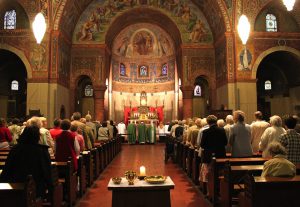 That Sunday, I took my oldest daughter with me. I didn’t even know where there was a Catholic church. I had to look it up in the phone book…and we’re late getting there, so I was in a hurry. And we rushed up to the door and I stopped. And I said, “What am I doing here? I can’t go in there. That’s a Catholic church. The pope is an evil misogynistic oppressor of women. They have an all male priesthood. I can’t go in there. I can’t do that.” It was like I had a magnet inside of me and something was pulling me inside—that’s how strong it was. I go in and I stepped through the doors…and the Mass had already begun; this feeling came over me like “I’m finally home.” This shocked me. It brought tears to my eyes. I’m standing there and an usher came up to me. He said, “Would you like a seat?” I said, “Yes.” He took us all the way up front. I’m standing there in the pew, listening to the priest say the Mass. All of a sudden, this beam of power from above comes down, and it hits me on my head, knocks me on my knees. In that moment, I knew there was a God, that Jesus Christ was His Son, this was His Church, and He wanted me here. I just started to sob. My daughter said, “Mommy, what’s wrong?” And I just looked up at her and said, “I’m so happy!” And I was! After all those years of searching and searching for happiness and love… through the sex, the drugs, alcohol and the feminism, I finally, finally find it in the last place that I ever expected to find anything… in the Catholic Church. I was just filled with this incredible joy.
That Sunday, I took my oldest daughter with me. I didn’t even know where there was a Catholic church. I had to look it up in the phone book…and we’re late getting there, so I was in a hurry. And we rushed up to the door and I stopped. And I said, “What am I doing here? I can’t go in there. That’s a Catholic church. The pope is an evil misogynistic oppressor of women. They have an all male priesthood. I can’t go in there. I can’t do that.” It was like I had a magnet inside of me and something was pulling me inside—that’s how strong it was. I go in and I stepped through the doors…and the Mass had already begun; this feeling came over me like “I’m finally home.” This shocked me. It brought tears to my eyes. I’m standing there and an usher came up to me. He said, “Would you like a seat?” I said, “Yes.” He took us all the way up front. I’m standing there in the pew, listening to the priest say the Mass. All of a sudden, this beam of power from above comes down, and it hits me on my head, knocks me on my knees. In that moment, I knew there was a God, that Jesus Christ was His Son, this was His Church, and He wanted me here. I just started to sob. My daughter said, “Mommy, what’s wrong?” And I just looked up at her and said, “I’m so happy!” And I was! After all those years of searching and searching for happiness and love… through the sex, the drugs, alcohol and the feminism, I finally, finally find it in the last place that I ever expected to find anything… in the Catholic Church. I was just filled with this incredible joy.
Jane experienced all at once the awe, holiness, joy, love, unity, and quiet we mentioned earlier.
God wants us to experience that reality of being at home with Him and in His Church. So we have three actions that will help us and others find their home with God:
1) We’ve redesigned our chapel, so that the physical surroundings give us an experience of God’s home.
- The previous chapel looked like this.
- This is what the new one will look like!
The new chapel is supposed to be beautiful, sacred, and homey. The focus will be on the tabernacle, which is majestic because the King of kings is majestic. The ceiling tiles, the pillars, the wooden panels, made in Spain, will all add to the beauty. The windows have been enlarged significantly so that God’s light can enter, and we can appreciate the natural beauty of the garden outside. It’s going to have a carpet so that we can sit on the floor at the feet of Jesus the way Mary of Bethany did (Lk 10:39). And we’re going to have to take off our shoes like Moses, because we’ll be on sacred ground (Cf. Ex 3:6).
This chapel is designed to be a second home for us. I envision people going in and out constantly, 24 hours a day. People will come in to find nourishment, strength, peace, and joy; to say, “I love You, Jesus,” “Jesus, I adore You,” “I need You,” “Please help me.” I would love non-Catholics to feel comfortable in the chapel because Jesus is waiting for them there; this will be everyone’s home; everyone’s welcome. Even if they don’t recognize Him in the Eucharist, they’ll still encounter Him. This will be a place of refuge, where broken people can find healing.
And then Jesus will send them out on a mission to love like Him! Everyone will come out with more grace, even if they don’t feel it, and then they’ll share what they’ve received, and love more when at home, be more virtuous at work, and proclaim Him in every circumstance. And then they’re going to invite their friends and strangers to come.
In this season on the Eucharist, our goal is to have a Eucharistic heart, meaning one that recognizes Jesus in the Eucharist, and goes to Him to be with Him. And we’ll express this by committing 15 minutes of adoration a week. He’s calling us from the burning bush, and we’re invited to respond.
2) We’re four weeks away from Easter, and God is asking us to invite people home the way we did in Advent. And it always starts with prayer. Do you remember that story about the church where the people wrote down in the wet concrete underneath the carpet of their church, the names of their loved ones about whose salvation they were concerned? We did something similar by writing down on cards the names of people we love and placed the cards underneath the altar so that we could pray for these dear ones. The response to this initiative was very positive! We’re getting ready for Easter! About whom are we thinking who might not know Jesus or be far from Him? Feel free, after the homily to take the cards, write down the names, and then put the cards into the collection basket.
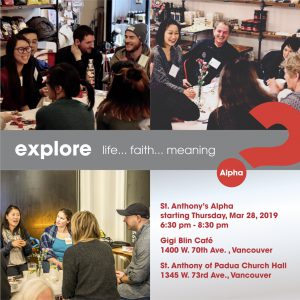 3) We’re starting Alpha on Thursday, March 28, 2019. God calls us by name, gently, without forcing, but waiting for a response. Alpha is a perfect place to encounter God’s truth, goodness, and beauty. One of the most beautiful things for me is when I see the people at Alpha have an experience of being at home. One young man told me how the hospitality there is so good; people are friendly and happy to get to know you. Through this experience of being at home, God calls us to experience something greater! The first video of Alpha is entitled: “Is there more to life than this?” And that speaks to hearts that are yearning to be at home. Think about coming this Thursday and inviting a friend. There’s no commitment with Alpha: We can try it and come back, or try it and not come back, or when we’re available.
3) We’re starting Alpha on Thursday, March 28, 2019. God calls us by name, gently, without forcing, but waiting for a response. Alpha is a perfect place to encounter God’s truth, goodness, and beauty. One of the most beautiful things for me is when I see the people at Alpha have an experience of being at home. One young man told me how the hospitality there is so good; people are friendly and happy to get to know you. Through this experience of being at home, God calls us to experience something greater! The first video of Alpha is entitled: “Is there more to life than this?” And that speaks to hearts that are yearning to be at home. Think about coming this Thursday and inviting a friend. There’s no commitment with Alpha: We can try it and come back, or try it and not come back, or when we’re available.
Jesus wants us to be at home with Him! Moses found this, so did Jane Brennan, and now we’re going to have a short testimony of someone who found their home in the Church, with the help of Alpha.
********************
Good morning/afternoon Everyone,
My name is Connor and I have been a parishioner of St. Anthony’s since August of 2017.
I am a recent convert, having been an atheist for most my life. Starting in June of 2017 I found myself seriously searching for a deeper meaning to life. I had a strong desire to find the truth. On a whim I started to read Scripture and this quickly led me to read other spiritual writings. By August as a result of my daily Scripture reading I felt a strong call to make a more serious commitment to God. I expressed to Fr. Justin my desire to become Catholic shortly after being introduced to him by my friends, Nathan and Megan Rumohr, who had invited me to start attending Mass with them at St. Anthony’s. Fr. Justin suggested that I take Alpha as part of my faith formation to help me grow in relationship with God.
In hindsight, acting on this suggestion was one of the best decisions in my life. For the first time in my nascent faith I experienced genuine fellowship, and as the season progressed my faith and desire for conversion deepened. This is largely thanks to my small group and the relationships that were built through it. The culmination of my Alpha experience was on the Alpha retreat during the prayer ministry time. After being prayed over by my Alpha small group leader, Julio, I felt the most extreme sense of love and peace settle over me. I also felt a burning desire to pray over him, so I did! This experience proved to be the final “push” for me. I had felt the love and peace that God desires for us all, and any reservations I had about the Catholic faith melted away. Not long after returning from the retreat I told Fr. that I wanted to be received into the Church and I was baptized, confirmed, and received First Communion on December 23rd, 2017.
Since my Baptism I have been actively involved within the parish – especially with Alpha and I can safely say that I consider all of them my extended Alpha “family”. I strongly encourage you to attend the upcoming season and also to consider bringing a family member or friend along with you to see what God has in store! If you have any questions please feel free to approach any of the Alpha team members.
Thank you and God bless!



